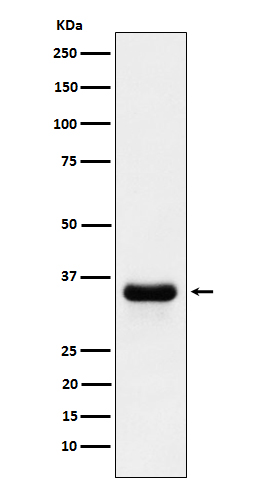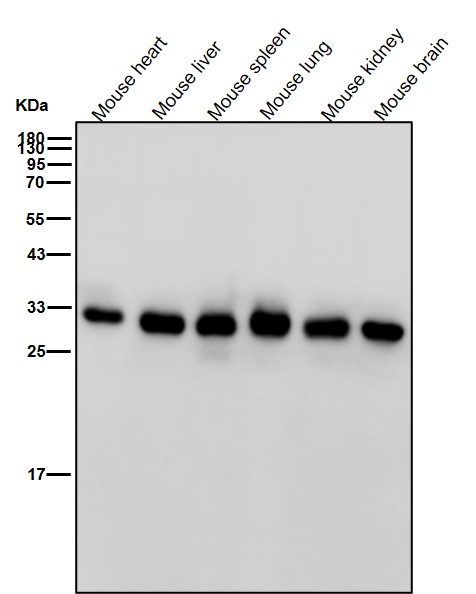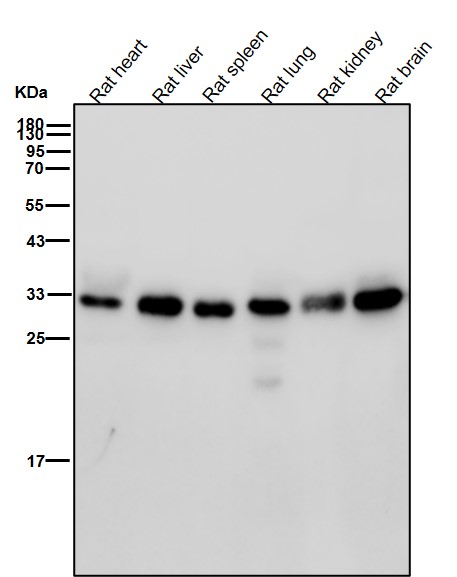


| WB | 咨询技术 | Human,Mouse,Rat |
| IF | 咨询技术 | Human,Mouse,Rat |
| IHC | IHC:1/100-1/200;IHF:1/50-1/200 | Human,Mouse,Rat |
| ICC | 1/50-1/200 | Human,Mouse,Rat |
| FCM | 咨询技术 | Human,Mouse,Rat |
| Elisa | 咨询技术 | Human,Mouse,Rat |
| Aliases | 26S proteasome non-ATPase regulatory subunit 14; PAD1; POH1; Psmd14; RPN11;;PSMD14 |
| WB Predicted band size | 35 kDa |
| Host/Isotype | Rabbit IgG |
| Antibody Type | Primary antibody |
| Storage | Store at 4°C short term. Aliquot and store at -20°C long term. Avoid freeze/thaw cycles. |
| Species Reactivity | Human,Mouse,Rat |
| Immunogen | A synthesized peptide derived from human PSMD14 |
| Formulation | Purified antibody in PBS with 0.05% sodium azide,0.05% BSA and 50% glycerol. |
+ +
以下是关于PSMD14抗体的3篇参考文献及其摘要内容:
1. **文献名称**:*PSMD14 regulates cell cycle progression through deubiquitination of CDKN1B in breast cancer*
**作者**:Li X, et al.
**摘要**:本研究利用PSMD14特异性抗体,揭示了其在乳腺癌细胞中通过去泛素化CDKN1B调控细胞周期进程的机制,表明PSMD14可能作为乳腺癌治疗的潜在靶点。
2. **文献名称**:*Structural and functional analysis of the 19S proteasome subunit PSMD14*
**作者**:Schmidt M, et al.
**摘要**:通过PSMD14抗体进行免疫共沉淀和质谱分析,解析了其在蛋白酶体组装中的关键作用,并发现其缺失会导致泛素-蛋白酶体系统功能受损。
3. **文献名称**:*PSMD14 as a prognostic biomarker in glioblastoma: Insights from antibody-based tissue microarray analysis*
**作者**:Wang Y, et al.
**摘要**:利用PSMD14抗体对胶质母细胞瘤组织芯片进行染色,发现其高表达与患者不良预后相关,提示PSMD14可能成为疾病分层的生物标志物。
以上文献均涉及PSMD14抗体的应用,涵盖癌症机制、结构功能研究及临床预后分析。如需具体期刊信息或发表年份,可进一步补充检索条件。
The PSMD14 antibody is a crucial tool for studying the 26S proteasome regulatory subunit, a component of the ubiquitin-proteasome system responsible for targeted protein degradation. PSMD14 (Proteasome 26S Subunit, Non-ATPase 14), also known as POH1 or RPN11. is part of the 19S regulatory particle that recognizes and deubiquitinates polyubiquitinated substrates, enabling their translocation into the proteolytic 20S core. This subunit contains a conserved JAMM/MPN domain critical for its metalloisopeptidase activity, distinguishing it from other regulatory particles.
Researchers use PSMD14 antibodies in techniques like Western blotting, immunoprecipitation, and immunofluorescence to investigate proteasome assembly, protein turnover mechanisms, and cellular responses to proteasome inhibitors (e.g., bortezomib). Its expression and function are implicated in cancer progression, neurodegenerative diseases (e.g., Alzheimer’s), and immune regulation, making it a potential therapeutic target. Commercially available antibodies are typically validated for specificity in human, mouse, or rat samples, with some targeting epitopes in the N-terminal or JAMM domains. Studies employing these antibodies have clarified PSMD14’s role in maintaining genomic stability, cell cycle control, and apoptosis. However, users should verify cross-reactivity and optimal experimental conditions due to structural similarities with other proteasomal subunits.
×